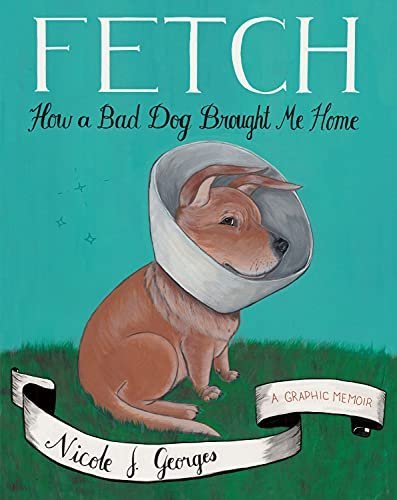Author of
Relative Fiction (Ten Speed Graphics, 2027)
Emotional Support Animals (Andrews McMeel, 2026)
The Ballad of X-Ray and Koko (Hoilday House, 2026)
Calling Dr. Laura (HarperCollins, 2013)
Fetch: How a Bad Dog Brought Me Home (HarperCollins, 2017)
Nicole J. Georges is a writer, illustrator, podcaster & professor from Portland, OR.Nicole has been publishing autobiographical comics about her queer vegan life for the past 25 years, evolving from teen zinester to graphic novelist. Her work explores themes including identity, family secrets, queer community, animals, self-help, and the inner workings of a queer, punk feminist from a Syrian-American home.Nicole teaches at California College for the Art’s MFA in Comics Program. She splits her time between Portland and Los Angeles with her chomeranian best friend, Ponyo Georges, and is the host of the queer art, advice & vegan food podcast, Sagittarian Matters.
Twitter / Instagram / Facebook / TikTok / nicolejgeorges.com
Nicole J. Georges
Books by Nicole
Relative Fiction (Ten Speed Graphics, 2027)
Nicole J. George’s brilliant and moving new graphic memoir about healing herself and her relationship with her mother after uncovering the big family secret —that her father wasn’t really dead—that she began to unpack in her Lambda Award-winning debut Calling Dr. Laura.
Emotional Support Animals (Andrews McMeel, 2026)
An irresistible collection of the adorable emotional support animals (known as “Anonymous Fuzzballs”) that offer words of compassion and wisdom, as featured on Instagram, and that grew out of Nicole’s recent journey of healing and forgiveness.
The Ballad of X-ray and Koko (Holiday House, 2026)
A transporting Middle Grade graphic novel that tells the story of 12-year-old Xenia, nicknamed X-ray, her pet chicken Manicotti, a life-changing queer friendship and her journey to finding the place where she belongs.
Calling Dr. Laura (HarperCollins, 2013)
When Nicole Georges was two years old, her mother told her that her father was dead. When she was twenty-three, a psychic told her he was alive. Her half-sister, saddled with guilt, admits that the psychic is right and that the whole family has conspired to keep him a secret. Sent into a tailspin about her identity, Nicole turns to radio talk-show host Dr. Laura Schlessinger for advice.
PRAISE
"Honest and charming...[Georges] makes her debut as a developed and skilled storyteller." –Philadelphia Inquirer
"A charmer."--Cleveland Plain Dealer
A bracing debut from a promising graphic novelist that deals with abuse, forgiveness, and family secrets."--Daily Beast
"There's a depth to Georges' work...an intense interest in finding out not just who she is but what it means and why it matters."--Oregonian
“[A] tart, honest graphic memoir."--Slate
"A tragicomic graphic memoir with a stunning indie aesthetic."--Bookslut
“An engrossing, lovable, smart and ultimately poignant trip through a harrowing emotional bottleneck in family life. It's great art, great writing, a great story – I can't wait for what's next from Nicole. What a wonderful book.”--Rachel Maddow
"Engaging...incisive...The author approaches [her story] with the tenacity of a detective."--Publishers Weekly
"Nicole Georges spins a riveting family mystery. There's a powerful chemistry going on between her delicate drawings and the probing honesty of her investigations. Calling Dr. Laura is disarming and haunting, hip and sweet, all at once."--Alison Bechdel
"I wouldn't want to live in a world without Nicole! And now no one has to! This book is a charming little gem. An honest glimpse into the life of a self-employed, smart and witty Portland femme gay with an upbringing so weird it's normal."--Beth Ditto
"Anyone who knows Portland, OR. will know Nicole J. Georges, the witty girl with the cat glasses and a devoted following for her talents as an illustrator and zinester . . . Whatever the results, one can bet that this new work from Georges will be a good time."--Lambda Literary, "Five New Queer Voices to Watch Out For"
Fetch: How a Bad Dog Brought Me Home (HarperCollins, 2017)
When Nicole Georges was sixteen she adopted Beija, a dysfunctional shar-pei/corgi mix — a troublesome combination of tiny and attack, just like teenaged Nicole herself. For the next fifteen years, Beija would be the one constant in her life. Through depression, relationships gone awry, and an unmoored young adulthood played out against the backdrop of the Portland punk scene, Beija was there, wearing her "Don’t Pet Me" bandana.
Georges’s gorgeous graphic novel Fetch chronicles their symbiotic, codependent relationship and probes what it means to care for and be responsible to another living thing — a living thing that occasionally lunges at toddlers. Nicole turns to vets, dog whisperers, and even a pet psychic for help, but it is the moments of accommodation, adaption, and compassion that sustain them. Nicole never successfully taught Beija "sit," but in the end, Beija taught Nicole how to stay.




